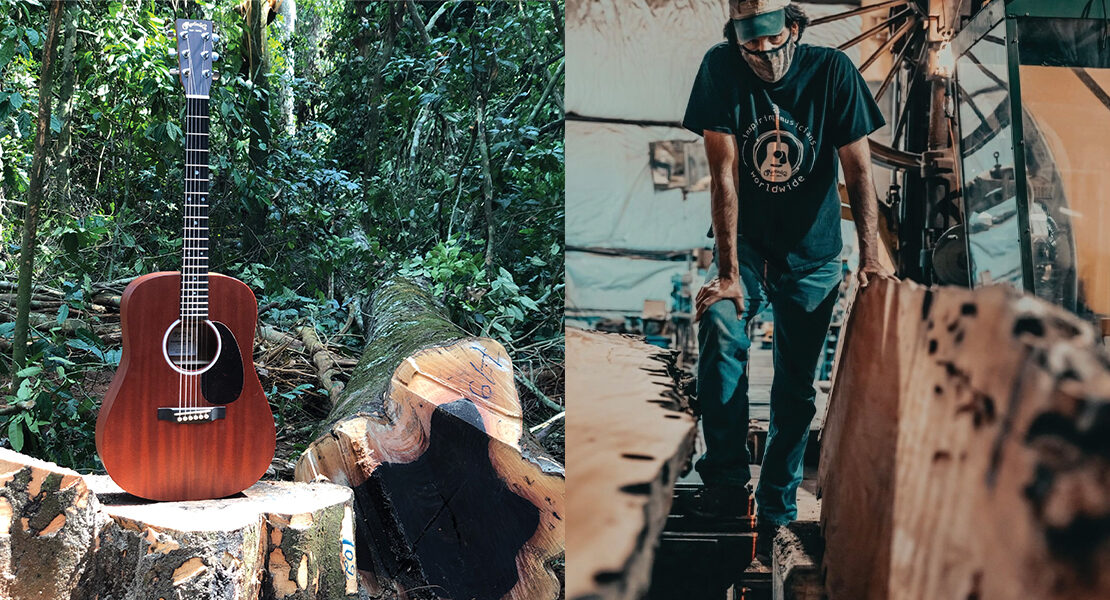Striving For Sustainability

Founded in New York City in 1833 and located in the Lehigh Valley since 1838, C.F. Martin & Co. guitar company has held a growing tradition of sustainability, addressing emerging environmental issues such as our earth’s dwindling forest resources.
Stringed instruments such as guitars have traditionally been crafted with a combination of four quintessential woods—spruce, mahogany, ebony, and rosewood—due to these natural materials’ durability, beauty, and suitability for specific purposes, such as crafting fretboards and necks and creating desirable tonal qualities. The woods are becoming more finite across the planet.
“Protecting the environment and all of its precious resources has been at the forefront of my family’s business since its inception,” declared Christian “Chris” Frederick Martin IV, chairman and CEO of the iconic guitar company based in Nazareth.
This statement, big and bold on the company’s website at martinguitar.com, has been backed up by the company’s efforts.
As an undisputed leader, C.F. Martin & Co. holds a lot of sway across the music industry. In 1997, Martin became the first guitar maker to purchase tonewoods certified as sustainably harvested by third-party nonprofits such as the Forest Stewardship Council (FSC). Many other guitar manufacturers eventually followed suit. The Martin-organized Wood Summit includes representatives from organizations such as National Resources Canada, the World Resource Institute, the U.S. Department of Agriculture and the Environmental Investigation Agency, discussing responsible and sustainable global sourcing of raw materials specific to guitar and other stringed-acoustic instrument manufacturing.
“Honoring and protecting our environment” is one of the core values of Martin’s mission statement and in part is what earned the company special status, in 2018, as a Certified B Corporation. Another third-party certifier, B Corporation rates companies based on 170 rubrics that measure companies’ commitments to environmental and social responsibility in addition to the bottom line—in other words, “people, planet and profit.” It’s a game-changing way of doing business. Other companies sharing this distinction include Ben & Jerry’s and Patagonia. Martin was the first business in the music industry to receive this certification.
In 2019, Martin partnered with instrument string manufacturer D’Addario and set up a program to recycle used guitar strings (which are not part of traditional recycling programs). This year, the company partnered with environmental nonprofit reverb.org to eliminate single-use plastic at the NAMM (National Organization of Music Merchants) show in Anaheim, California.
Martin’s “Greenprint,” viewable on its website (martinguitar.com), highlights the many ways the company saves energy, reduces waste, and protects the environment on a daily basis.
Chris Martin concedes that one of the critical tasks of holding the company, and the industry, up to meaningful sustainability standards is knowing partners have a genuine commitment.
“We’ve worked closely with a woman in purchasing who really knew exotic woods and knows all the players,” he said. “I would say one of crucial jobs going forward is knowing that the intermediary between us and the tree are as reliable and forthright as we know we are and that everyone in the supply chain believes in telling the truth.”
Sometimes countries that don’t require a lot of paperwork mix legitimate sustainably harvested woods with not-so-ecofriendly raw materials, he said, undermining company’s like Martin Guitar’s efforts to do the right thing. He added that U.S. and European wood suppliers have not generally presented much of a problem in this regard. Third-party certifiers such as the Forest Stewardship Council, partnering with the Rainforest Alliance, help police his problem, Martin said, adding that Martin’s factory in Mexico recently received high marks for following proper environmental protocols. “You have to prove that, from the tree to the finished guitar, these woods follow what is called the proper chain of custody and are not comingles. We’ve audited that chain of custody and think it’s legit.”
Martin said he empathizes with small wood suppliers as certification as a sustainable producer can be expensive. “Some small vendors say ‘I can’t afford it.’ It’s expensive to get certified as an owner of trees. But if it passes the smell test, we go in and say ‘How can we help you get FSC certified?” That’s our dream that, as much as possible, we know where all the woods we use came from and that it’s not being overharvested in the short-term.”
Educating the guitar customer is also paramount to Martin’s sustainability efforts, Martin said, as in the company attempt to steer customers towards wood that may not be cosmetically perfect but are functionally sound.
“It rears its ugly head sometimes. A customer might say “It sounds great, but I just don’t like the way the wood looks.” In those instances, he said, Martin is willing to offer a refund or substitution and the next customer in line is generally perfectly happy to take the guitar.
“What I’ve learned is that it’s more about telling the story,” Martin said, elaborating that guitars with more “cosmetic character” often translates into woods that were more responsibly harvested. That message particularly resonates with younger customers, he said. “Certified [sustainably produced] guitars are not any cheaper to make, and you can argue you’ve actually spent more money [to produce them]. What we’ve seen is, gradually, younger players are willing to speak out about the environment and are more receptive. They say ‘I am concerned about these issues, and I just want a guitar to be made the way it should be played. It’s complicated these days. These basic woods are called ‘rare’ for a reason.”
Martin concedes that his company has some challenges with some Asian manufacturers who seem willing to buy everything on the market when it comes to wood supply, no matter what the source. “Some of these trees should not be cut down,” he said. “Let these trees mature. That’s when they’re valuable.”
Another consideration, the fourth-generation Martin said, is the proper curing of the woods. “If you push the wood through the manufacturing process too fast to let it get stable—if it’s on the truck in a variety of different climates—and are pressured with back orders from screaming customers, then you can have problems. That’s why we bring wood in and don’t use it right away. It’s like making wine in reverse.”













